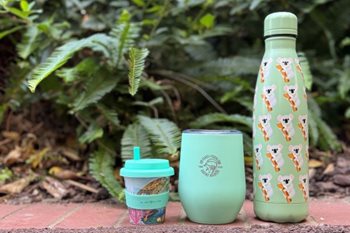Enjoy the outdoors
Getting outdoors is more than just a walk in the park! It’s a way to notice the little things, and to fall in love with the incredible biodiversity all around you.
Find an outdoor activity you like and take a break from the hustle and bustle of life, in nature.
In the words of David Attenborough
“No one will protect what they don’t care about, and no one will care about what they have never experienced” so it’s important to spend time appreciating the beauty that surrounds us.
Walk, ride, or use public transport
Choosing to walk or cycle is great for the planet, and also great for your health – bonus!
If you do need a car, consider public transport, carpooling or car sharing options, and when you are driving at night, be sure to slow down so you can protect wildlife that might be near the road.
Leave no trace
Whether it’s a family day out at the beach or a hike in the park, it’s important to leave natural spaces just as we found them or even better!
Be sure to take your rubbish with you when you leave, and dispose of it properly. You could even pick up a few stray pieces of rubbish along the way. The wildlife will thank you!
Switch off
There are many ways we can reduce our footprint like turning off lights and power outlets you aren’t using, switching to energy efficient appliances and lightbulbs, and managing the temperature in your home with blinds, doors, and clothing, before using the heating and air conditioning.
Garden Greener
Whether your yard is big or small, you can create a tree-mendous space to help support local WA wildlife!
Planting native species provides healthy food and shelter for native animals and an extra bonus, will use less water.
Native plants also often need less fertilisers, so there are less chemicals in your yard, and less burden on your wallet!
No garden? No fear! Leave a clean bowl of water outside so passing wildlife can have a drink and a splash around on hot days.
Be waterwise
Speaking of splashing – there are lots of ways to reduce your water consumption.
- Take shorter showers and use a shower timer to keep you on track.
- Only water your garden on scheduled watering days, and water in the early morning or late evening to reduce evaporation.
- Turn the tap off when brushing your teeth, shaving, and hand-washing dishes.
- If you have the space, install a rainwater tank.
- Repair any leaks you notice as small drips can turn into large water bills!
- Plant native and drought-resistant plants.
- Whether it’s laundry or dishes, always run a full load to reduce the number of wash cycles. This will save both water and energy – win win!

Re-use
When we throw things away, it might be out-of-sight, out-of-mind, but it sticks around for a very long time.
While reducing your consumption is the best, often re-usable items are the most practical answer! Re-usable bags for the shops rather than plastic, and re-usable coffee cups and water bottles are all great options when you’re on the go.
This also extends to clothing – before you buy a new outfit or throw an old one away, can you do some repairs, or loan an outfit from a friend?
Travel responsibly
Travelling means visiting ecosystems that need just as much love as the ones at home, so it’s important to take care of them.
In particular, animals used in tourism overseas are often stolen from the wild and subjected to poor conditions.
Having your picture taken with these animals can enhance the illegal trade and pose significant welfare risks. Souvenirs may also be made from endangered animals, with ivory, tortoiseshells, fur, and reptile skins.
If you want to experience wildlife on holiday, research animal sanctuaries, licensed and accredited zoos, and regulated wildlife viewing.
Be Part of the Plan!